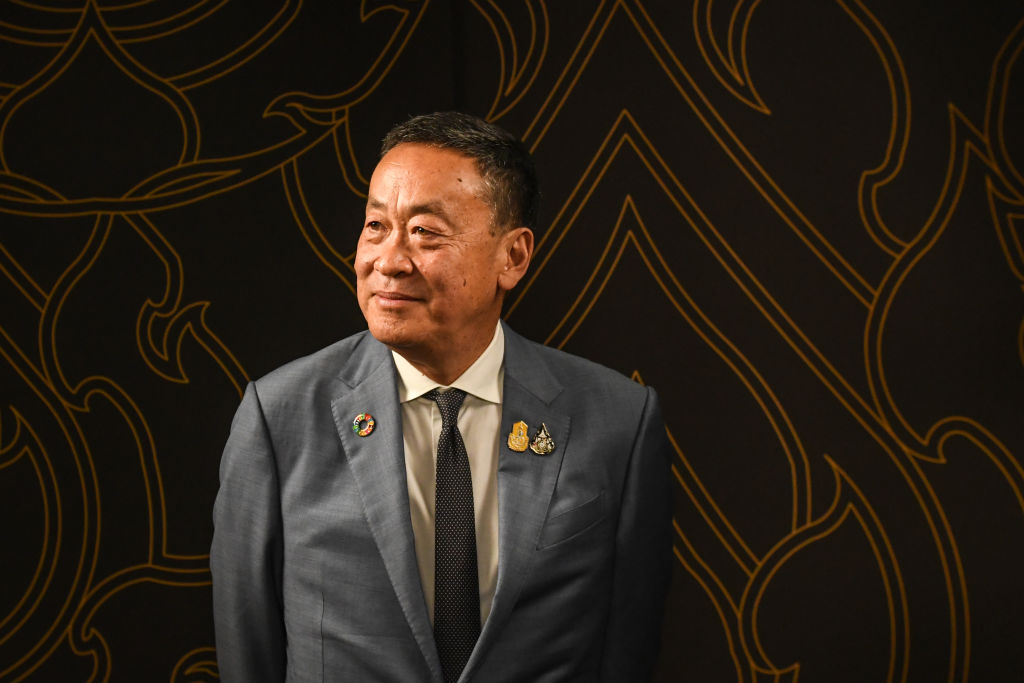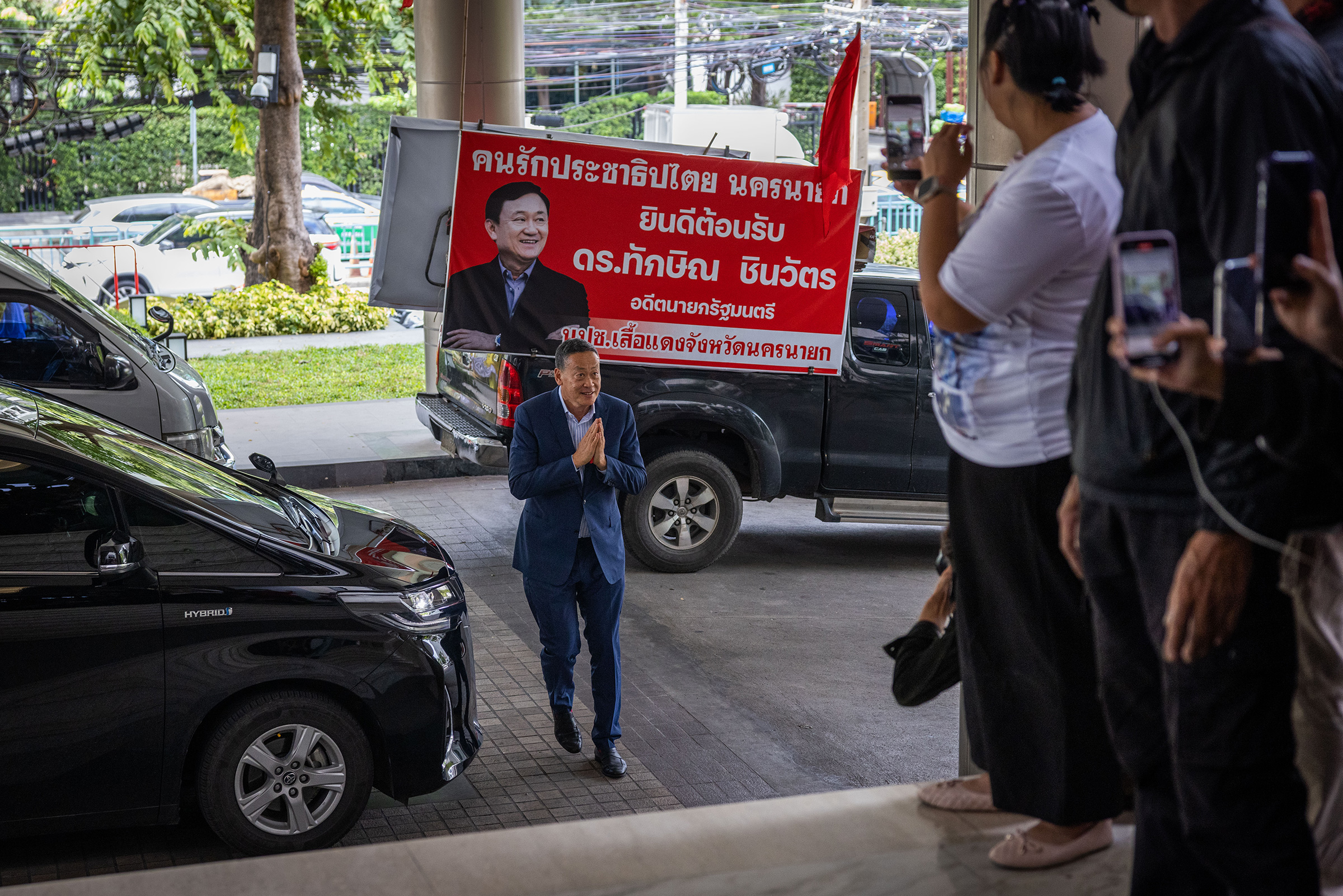
Thailand’s new Prime Minister has been off to a rocky start. The ascension in August of Srettha Thavisin, a former real estate developer and relative newcomer to politics, was marked by controversy—his Pheu Thai party partnered with the country’s military-backed and monarchy-supporting establishment, helping to prevent the more popular, progressive Move Forward party from taking power. His first month, too, was capped by tragedy, after a 14-year-old shooter killed two and injured five people at a popular mall in Bangkok on Wednesday.
Srettha, meanwhile, has set out over his first few weeks to define his premiership around economic populism, likening Thailand’s flagging economy, battered by the pandemic and falling investor confidence, to a “sick person” in need of healing.
But political observers worry that Srettha’s policies and pronouncements so far, while seemingly designed to win public confidence that he never started with, are either symbolic or, worse, shortsighted.
Read More: Thailand’s Populist Pheu Thai Party Finally Won the Prime Minister Vote—But at What Cost?
“Some of the measures that are intended to relieve the economy in the short term, are not sustainable in the long term,” Napon Jatusripitak, a visiting fellow at Singapore’s ISEAS-Yusof Ishak Institute tells TIME. “It's akin to putting bandage over a wound without treating it.”
What Srettha has done so far
Since his controversial elevation to the premiership, 61-year-old Srettha has worked hard to portray his leadership as one of benevolence, urging the military to delay their procurement plans to free up budget for “urgent efforts to help the people” and donating his salary to charity.
“It signifies perhaps even a bit of a merit-making to a certain extent,” Mark S. Cogan, an associate professor of peace and conflict studies at Japan’s Kansai Gaidai University, tells TIME, a reference to the Buddhist practice of accumulating good karma.“I think that there is a bit of damage control being done by Pheu Thai.”
In terms of foreign policy, Srettha has embarked on a proactive campaign to turn Thailand into an investment hub. “Thailand is open for business with all countries,” he said last week, after meeting with Tesla’s Elon Musk, restarting trade talks with the European Union, and agreeing to deepen bilateral trade with Cambodia.
But perhaps most significant are the populist domestic policies that have come to define Srettha’s first month in office: lowering electricity and fuel prices, a three-year debt moratorium for farmers, and—Pheu Thai’s flagship campaign promise—a digital wallet scheme that would distribute 10,000 baht to every Thai person above 16 years old. Set to be launched next year, the latter project is expected to inject 560 million baht into the economy and stimulate domestic spending.
But when Srettha unveiled a long-awaited policy statement containing all these proposals in parliament on Sept. 11, it was panned by politicians across the political spectrum for a lack of clear direction. While there was no shortage of urgent initiatives to spur economic growth, critics said the overall agenda lacked concrete plans to achieve long-term national development goals.
Sirikanya Tansakul from the progressive Move Forward party likened the policies to “applying steroids instead of medicine to cure the economic ills.” And Jurin Laksanawisit from the conservative Democrat Party said the ambition of Srettha’s goals fell short of what Pheu Thai had promised during the election campaign: “It doesn’t even match [Srettha’s] height,” he said, referencing the Prime Minister who, at 6 feet, 3 inches, is the second tallest leader in the world.
Read More: The Man Who Upended Thailand’s Politics
Experts warn that Srettha’s policies, which are not accompanied by a long-term economic strategy, will do little to tackle Thailand’s deep-rooted socio-economic problems. It would be hard, for example, to keep energy prices low unless prices are restructured, and the debt moratorium for farmers has been criticized for failing to address what sits at the core of farmers’ debt: their low income.
“Economic stimulation is incredibly important,” says Cogan. “But is that kind of stimulus necessary and is that stimulus sustainable?”
“That has to be supplemented with additional … policy changes that spark economic growth. And I have yet to see any kind of policy that would suggest something beyond the short-term stimulus,” he adds.
How Srettha’s government harkens to Pheu Thai’s populist roots
“It doesn't read Srettha,” says Napon, the Thai expert at the Singapore think tank, of Pheu Thai’s initial agenda. “[It] reads Thaksin,” he says, referring to the party’s patriarch and Thailand’s former Prime Minister from 2001 to 2006 Thaksin Shinawatra—whose return in August, after over a decade in self-exile, came as part of Pheu Thai’s deal with the conservatives.

Thaksin was defined by his populist economic initiatives, dubbed Thaksinomics, which included a debt moratorium for farmers and a scheme to hand one million baht to each of the country’s 80,000 villages. While such pro-poor policies and rhetoric effectively mobilized fervent supporters who were increasingly tired of Thailand’s conservative elites, they also attracted criticism for deepening Thailand’s economic vulnerabilities in favor of easy political gains. Amid allegations of corruption, Thaksin was ultimately overthrown in a military coup and fled the country, but he maintained massive influence over Thailand’s politics.
In 2011, Prime Minister Yingluck, Thaksin’s sister, launched a quixotic rice-pledging scheme promising to buy farmers’ rice at high prices while also selling them for a fat profit in the global rice market. It sparked a rice-growing craze in the agricultural sector only to flop spectacularly, burning a 518 billion baht ($13.5 billion) hole in the country’s economy. It also eventually led to Yingluck’s ousting by judicial coup amid charges of negligence. The fallout from the rice-pledging scheme has continued to linger, leaving her successors to deal with a sticky debt burden.
Srettha seems unlikely to repeat policy failures of such a scale, experts say, but his economic proposals are strongly reminiscent of the same Thaksin-style populism that puts political gain over economic soundness. The problem for Srettha, however, is that the Thai public today has already signaled it’s more interested in systemic, democratic reform than the type of economic promises Pheu Thai is accustomed to offering.
Why Srettha’s can’t seem to give the Thai people what they really want
Titipol Phakdeewanich, dean of the political science faculty at Ubon Ratchathani University, thinks Pheu Thai is “still in denial” over how far its platform of populist economic policies can go to salvage the party’s reputation, which first took a hit when Pheu Thai came in second in the May election that it had expected to win by a landslide. “If it would work, then they would have already won [by] a landslide with the [campaign promise of a] 10,000 baht digital wallet,” says Titipol.
The military-backed rule of the past decade under former Prime Minister Prayut Chan-o-cha was marked by a historic wave of pro-democracy and anti-monarchy protests, and the May election—which saw opposition parties Move Forward and Pheu Thai decisively win the most and second-most votes, respectively—was widely seen as a mandate against the military elites that had long dominated Thai politics.
But Pheu Thai lost much of what good will remained when it decided to abandon an initial anti-military coalition with Move Forward and form a coalition government with the very military-aligned parties that Pheu Thai supporters had historically railed against, including in deadly protests in the late 2000s and early 2010s.
Read More: Thailand’s Election Winner Fails First Parliament Vote to Become Prime Minister—What to Know
“Now the public sentiment has changed,” and there are “more demands for political reform,” says Titipol. “This is the main thing that they have to be brave to touch on and focus on as well, instead of ignoring it and focusing only on economic policy.”
But the political reforms that Pheu Thai had once promised with progressive allies are proving difficult to achieve with its new coalition partners. While it had shared a joint pledge with Move Forward to end mandatory military conscription, the most recent plans announced by the defense ministry only reduce the conscription quota, with a “goal” to eventually transition to a voluntary military.
For his part, Srettha announced on Tuesday the formation of a committee to amend the military-drafted constitution—also one of Pheu Thai’s most prominent campaign promises with its progressive counterparts. But the amendment, set to be completed within four years, has been criticized for its generous time frame, which observers say will likely anger progressives who called for swift, radical reforms. And it remains to be seen how far the amendment will go with strong conservative forces firmly lodged in Srettha’s administration.
With one month down in his four-year term as Prime Minister, observers say that Srettha still has the opportunity to make a mark and salvage his reputation by pushing for reform despite the obstacles—though he hasn’t appeared to pursue that path yet.
“That could be Pheu Thai’s legacy, that it formed an unholy alliance in order to put the country on a path of reform. That could be a good narrative that may rejuvenate Pheu Thai’s image,” says Napon. “But it seems that [Srettha] has not made [any] commitment to engage in such reforms. Because doing so could put it out of favor with whoever enabled Pheu Thai to win the Prime Minister selection.”
More Must-Reads from TIME
- Cybersecurity Experts Are Sounding the Alarm on DOGE
- Meet the 2025 Women of the Year
- The Harsh Truth About Disability Inclusion
- Why Do More Young Adults Have Cancer?
- Colman Domingo Leads With Radical Love
- How to Get Better at Doing Things Alone
- Michelle Zauner Stares Down the Darkness
Contact us at letters@time.com